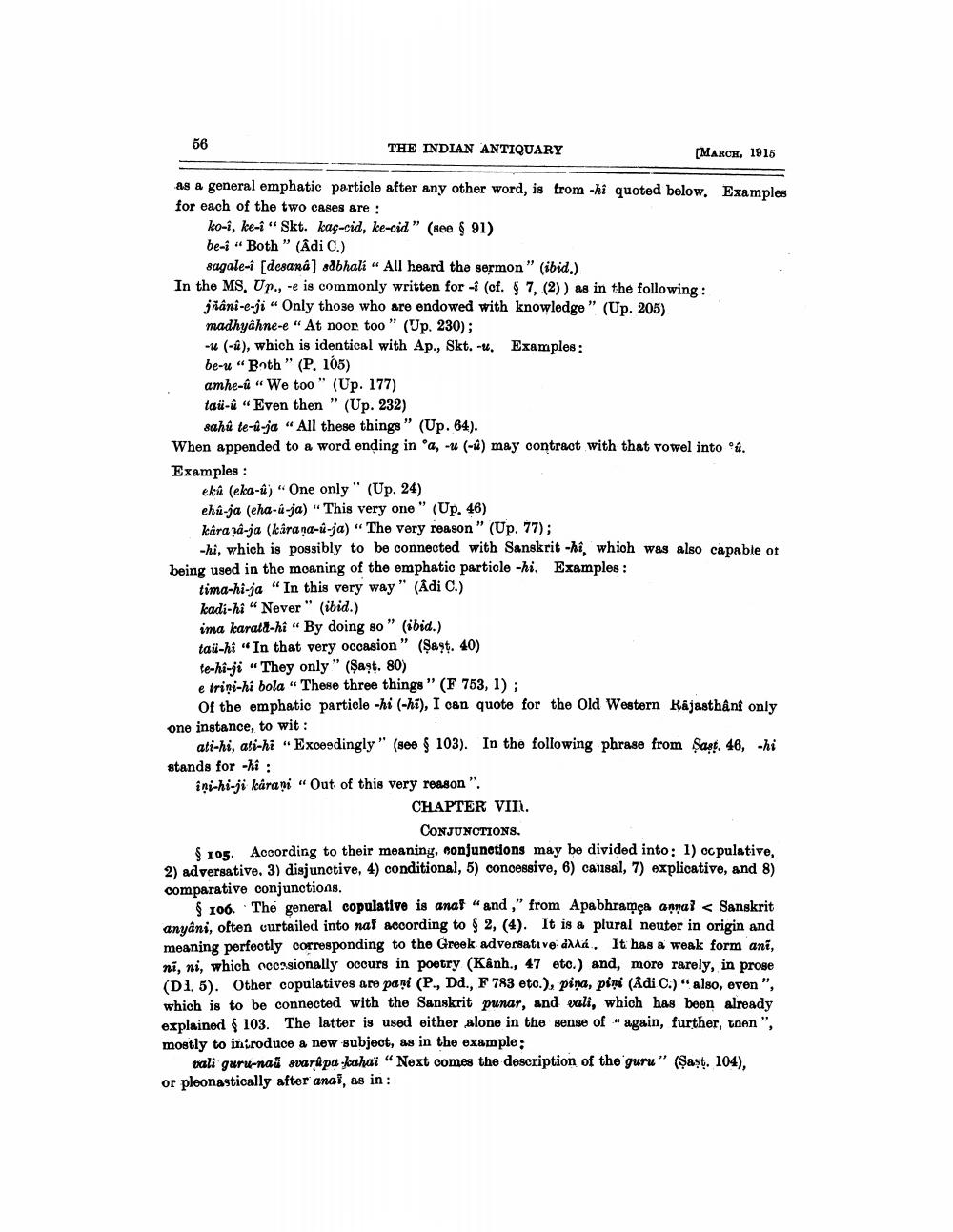________________
56
THE INDIAN ANTIQUARY
(MARCH, 1915
as a general emphatic particle after any other word, is from -hi quoted below. Examples for each of the two cases are :
ko-i, ke-1" Skt. kac-cid, ke-cid" (see $91) be-i "Both " (Adi C.)
sagale-i [desara) sabhali “ All heard the sermon" (ibid.) In the MS. Up., -e is commonly written for- (of. $ 7, (2)) as in the following:
jñâni-e-ji "Only those who are endowed with knowledge" (Up. 205) madhyahne-e " At noor too" (Up. 230); -u (-), which is identical with Ap., Skt. -u. Examples: be-u "Both" (P. 105) amhe-ú "We too" (Up. 177) taü-û “Even then" (Up. 232)
sahü te-u-ja "All these things" (Up. 64). When appended to a word ending in ea, -u (-u) may contract with that vowel into . Examples :
eků (eka-ü) "One only" (Up. 24) ehú-ja (eha-u-ja) "This very one" (Up. 46) karara-ja (karana-u-ja) "The very reason" (Up. 77);
-hi, which is possibly to be connected with Sanskrit -hi, which was also capable of being used in the moaning of the emphatic particle -hi. Examples:
tima-hi-ja "In this very way" (Adi C.) kadi-hi "Never" (ibid.) ima karala-hi" By doing so" (ibid.) taü-hi "In that very occasion " (şast. 40) te-hi-ji "They only " (şaşt. 80) e triņi-hi bola "These three things" (F 753, 1);
Of the emphatic particle -hi (-hi), I can quote for the Old Western Rajasthani only one instance, to wit :
ati-hi, ati-hi "Exceedingly" (see $ 103). In the following phrase from Şast. 46, -hi stands for -hi : iņi-hi-ji karani "Out of this very reason".
CHAPTER VIII.
CONJUNCTIONS. $ 105. According to their meaning, conjunctions may be divided into: 1) ocpulative, 2) adversative. 3) disjunctive, 4) conditional, 5) concessive, 6) causal, 7) explicative, and 8) comparative conjunctions.
106. The general copulative is anat "and," from Apabhramça anwal < Sanskrit anyâni, often uurtailed into nal according to $ 2, (4). It is a plural neuter in origin and meaning perfootly corresponding to the Greek adversative dá. It has a weak form ani, ni, ni, which occasionally occurs in poetry (Kênh., 47 etc.) and, more rarely, in prose (D1, 5). Other copulatives are pani (P., D., F 783 etc.), pina, pini (Adi C:) " also, even", which is to be connected with the Sanskrit punar, and vali, which has been already explained 103. The latter is used either alone in the sense of again, further, then", mostly to incroduce a new subject, as in the example:
vali guru-nal svarúpa -kahaï "Next comes the description of the guru" (sast. 104). or pleonastically after anai, as in:




